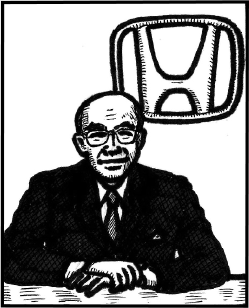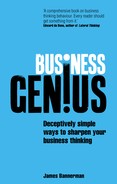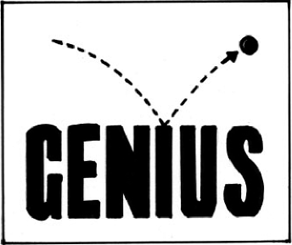The third major Block and Limitation to Business Genius is limited resilience.
Or, to put it another way, not being able to bounce back from setbacks, which is an amazingly important skill if we want to excel at work!
The young César Ritz, for example, could easily have quit the hotel industry after he was fired as a wine waiter and told, ‘You’re an unsuitable candidate for the hotel trade!’ But Ritz wasn’t prepared to let this happen.
Similarly, Walt Disney – who once got fired by a newspaper editor because ‘he lacked imagination and had no good ideas’ – could easily have taken this crushing criticism to heart (and opted for a less creative career path instead) but he, too, was too driven to let his ambitions get thwarted.
Or how about the actor Ben Affleck, whose career struck an all-time low in 2005 when the movie Surviving Christmas came out. He must have been tempted to pack it in, as they say, but as Nassim Nicholas Taleb (the author of Black Swan and Anti-Fragile) highlights, ‘Tough times don’t last, tough people do.’
According to Affleck’s Bourne Identity best friend Matt Damon (in a ShortList magazine interview, August 2013) Affleck’s agent said to him: ‘OK, this [the movie] is going to come out and it’s going to be really bad. This is it. This is the bottom of the mountain right here, we start walking uphill today.’
Consequently, Affleck found the inner strength to pick himself up and dust himself off and, step-by-step, he went on to not only act in, but also direct, Argo – a movie about an ingenious science-fiction plan to rescue hostages, which catapulted his career to an all-time high!
So please bear this in mind within the context of the work you do.
Few Business Geniuses enjoy careers where everything runs smoothly from start to finish. On the contrary. Just look at the careers of everyone – from Milton Hershey to Henry Ford and even H. J. Heinz – who took the knocks, and yet still found a way to clamber back from bankruptcy.
In fact, it could be argued that some industries – like the music industry and the world of book-writing – would barely exist at all if it wasn’t for resilient people doggedly carrying on in the face of constant rejection and setbacks.
In the early days, for example, the guitarist Mark Knopfler had very little money. So did he let that hold him back? No. He just named his band Dire Straits. Years later, when he was making significant amounts of money, envious delivery men made the flippant remark that he was simply getting ‘money for nothing’. So did he let that stinging comment dent his pride? No. He just used it as the title for his next song, and ended up making even more money!
Similarly, it’s said that J. K. Rowling’s Harry Potter was rejected by 12 publishers before it finally got signed up by Bloomsbury and, even then – according to www.literaryrejections.com – she was told by her editor to ‘get a day job because there’s little chance of making money in children’s books.’ There are even instances when despondent authors have thrown their scripts into the bin out of despair, only to have them retrieved by partners who’ve helped to bolster their resilience. Stephen King, for example, did this with Carrie (after it had been rejected by 30 publishers), but then later went on to sell over 350 million books!
So, if it’s Business Genius you’re after, please be aware that, even if you fall down, you don’t always have to stay down. For, as Joe Simpson (the mountaineer of Touching the Void fame, who literally fell off a mountain in The Andes because his colleague had to cut the rope before they both fell off) survived to say: ‘Success is choice, not chance.’

UP! YOUR RESILIENCE
NUGGET
A classic example of Business Genius resilience is the Honda story Tony Robbins used to give as part of his ‘Awaken the Giant Within’ seminars.
Robbins highlighted how Soichiro Honda’s commercial ambitions were thwarted time and time again. However, he refused to give up. Literally.
To begin with, in 1938, the specialised piston rings he strived to create were rejected by Toyota because they weren’t of a sufficiently high standard.
So, did he call it a day? No. He went back to college to improve them, only to have his ‘absurd designs’ mocked by peers and teachers alike.
Then, two years later, he finally secured a contract with Toyota only to face a new problem. Japan was ‘gearing up for war’ and there was no concrete available to help him build his factory. So he got creative, and made his own concrete.
Anyway. During the war his factory was bombed, not just once but twice!
And it didn’t stop there.
Because Japan had a severe shortage of raw materials, the enterprising Honda encouraged his team to go off and ‘pick up extra gasoline cans’ dropped by the Americans as ‘gifts from President Truman’. But then an earthquake levelled his premises. Was that it? No.
After the war, because ‘there was a gasoline shortage’ Honda decided to attach a small motor to his bicycle to help him get around. Other people loved his invention, but he lacked the capital needed to produce them. So what did he do? He wrote ‘18,000 personal letters’ to bike shops across Japan asking for assistance, managing to persuade 5,000 to invest. And, even then, his new bikes were considered too bulky, so he had to design a smaller one called the Supercub. Anyway, the reason for saying all this is because Honda’s ‘Power of Dreams’ organisation (which now employs over 100,000 people) wouldn’t exist if it hadn’t have been for Honda’s resilience, so no wonder he once said: ‘Success is 99 per cent failure.’


USEFUL TIPS AND
ESCAPE STRATEGIES
If you want to UP! your resilience, here are three practical tools that can help add value to that process:
1 EMBRACE LEARNED OPTIMISM
According to research by positive psychology experts Martin Seligman and Ilona Boniwell, the key difference between optimists and pessimists is linked to how they process information.
Imagine a good event has just happened in a business, for example, such as winning a brand new contract.
An optimist would probably process this information as follows:
- In an internal way, e.g. ‘I helped win this contract’.
- In a stable way, e.g. ‘I sense I may have a talent for winning contracts’.
- In a global way, e.g. ‘If I helped win this one, there’s a good chance I could help us win more’.
A pessimist, however, is likely to do the complete opposite. They’re likely to interpret the same event as follows:
- In an external way, e.g. ‘They must have been desperate to choose us!’.
- In an unstable way, e.g. ‘Sure, I helped win it, but I just got lucky’.
- In a specific way, e.g. ‘This was a one-off. We’re bound to lose the rest’.
Intriguingly, however, if they had not won that contract, the reverse would have happened.
An optimist probably would have processed this ‘bad event’ as follows:
- In an external way, e.g. ‘Maybe they wanted a less innovative supplier’.
- In an unstable way, e.g. ‘Never mind. This now frees me up to focus on securing more lucrative contracts’.
- In a specific way, e.g. ‘OK, this specific situation didn’t work out, but that happens sometimes. There are plenty of other commercial opportunities out there worth pursuing’.
A pessimist, meanwhile, would think:
- In an internal way, e.g. ‘The whole thing’s my fault. That’s why we lost it’.
- In a stable way, e.g. ‘Here we go again. I’ll never win a contract!’.
- In a global way, e.g. ‘Seems like we lose every contract we try to go for’.
Please bear this in mind with your own resilience. How you choose to interpret events – both good and bad – can either be your best friend who spurs you on, or your worst enemy who drags you back.
2 BECOME THAT DIAMOND
Diamonds are the toughest natural element on earth. According to author Barry Farber in his book Diamonds Under Pressure: Five steps to turning adversity into success, however, the only reason they’re so strong is because they’ve spent millions of years buried underground having their carbon crystals pressed in on from all sides, before being exploded up to the surface by volcanic activity.
So you may want to bear this in mind, if and when you feel crushed by your workplace experiences. They may be dreadful. However, if you can reframe your situation in an empowering way, you’re more likely to be able to bounce back from it.
Oh, and if you’re not too keen on the diamond metaphor, feel free to choose another one. Farber, for example, also points out how resilience is like the wings of a butterfly, saying: ‘In order to escape its cocoon, the butterfly must band its wings against the sides again and again, which gives its wings the strength to fly.’
3 ‘STAND UP EIGHT’
There’s an old Japanese proverb that states, ‘Fall down seven times, stand up eight’ and, in many ways, this sums up resilience.
Resilience means having that dogged determination to keep going no matter what, rather like the tiny spider in the Robert the Bruce story.
So next time you’re tempted to give up – and it’s bound to happen once in a while – remind yourself that Business Genius and ‘the spirit of enterprise’ are closely connected, and ‘the spirit of enterprise’ is all about an ongoing process of ‘do-learn-do’.

BUSINESS GENIUS IN ACTION:
NEXT STEPS …
In summary, if you want to UP! your resilience, here’s how:
- Pinpoint the reality that few careers run smoothly from start to finish (to help you develop a more balanced perspective with your own work).
- Investigate how others have managed to spring back from setbacks (because – as we saw with Ritz, Disney, Affleck and Honda – sometimes the seemingly impossible can become possible, if we use flexible persistence).
- Leverage the power of positive psychology and learned optimism (to ensure you prosper, both now and in the future).
- Orchestrate a plan for turning your adversity into success (for with a little imaginative thinking – as we saw with Mark Knopfler – there’s virtually always a way of spinning a perceived disadvantage into a perceived advantage).
- Target the learning experience inside every error of judgement (simply because we can often learn more from our mistakes – or ‘crucible moments’ as they’re sometimes called – than our business triumphs).

UP!SPIRATION
‘True success is about hanging on when everyone else lets go.’
Karren Brady (vice-chairman of West Ham United and one of the UK’s leading business figures)

